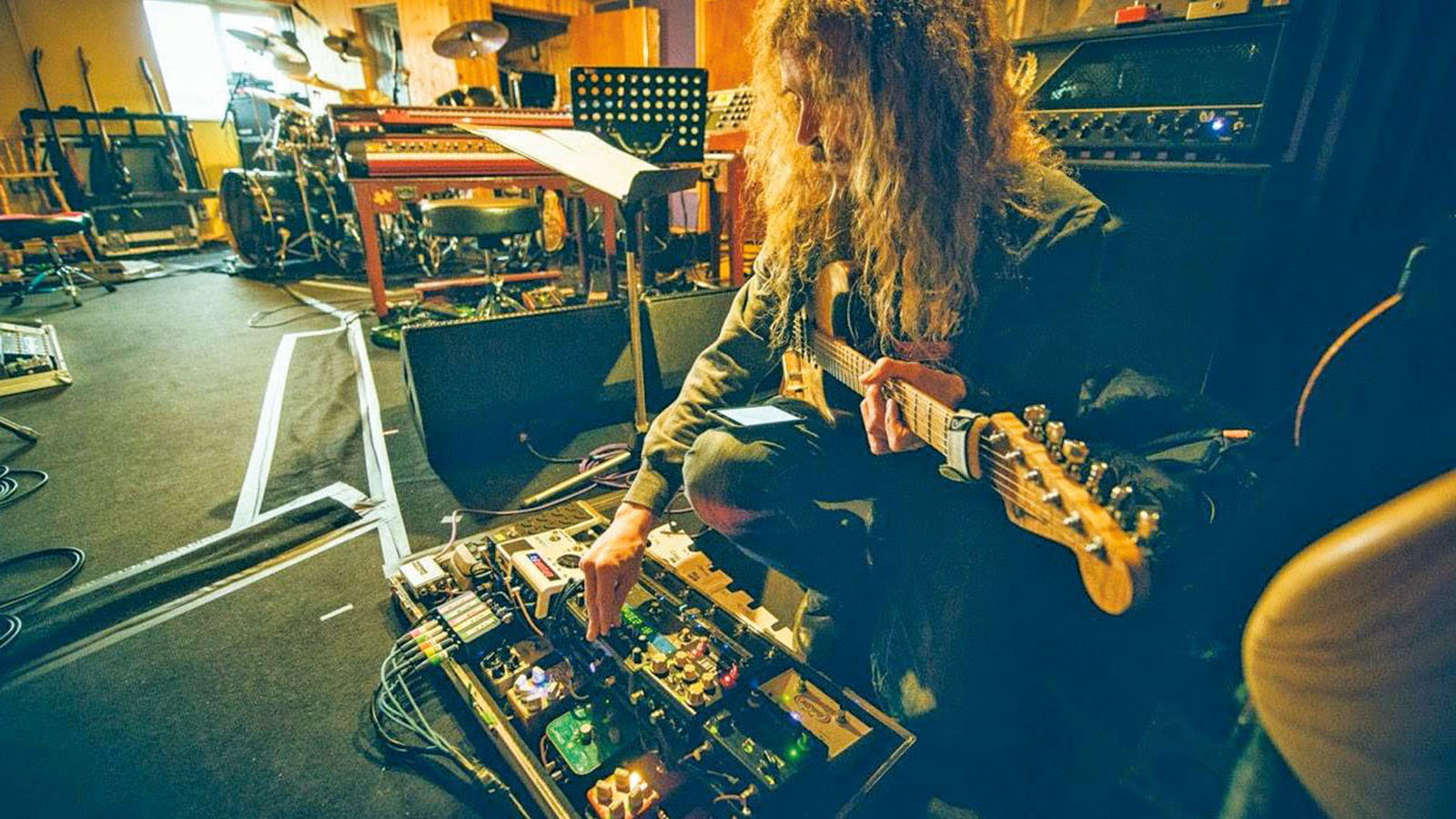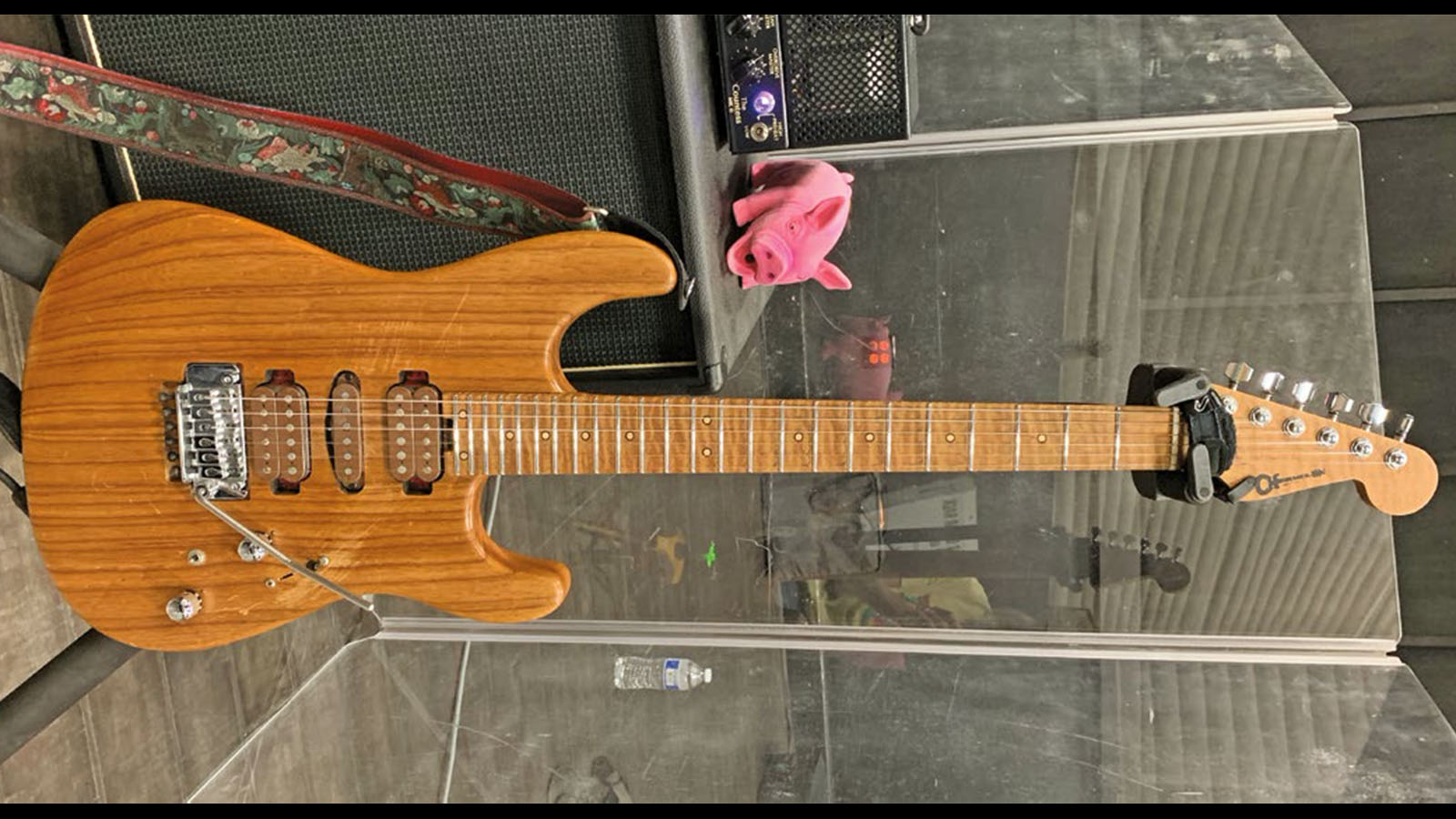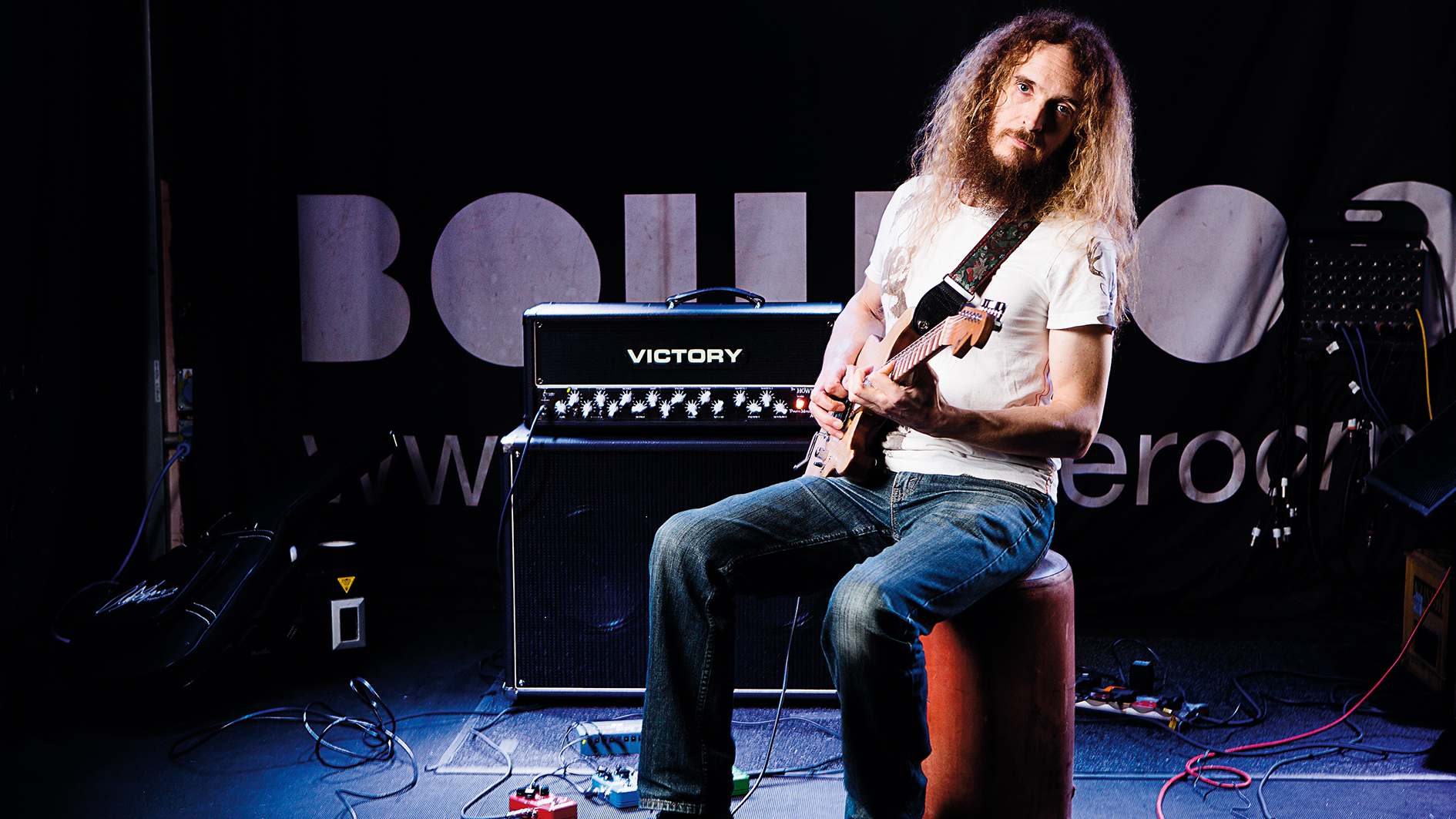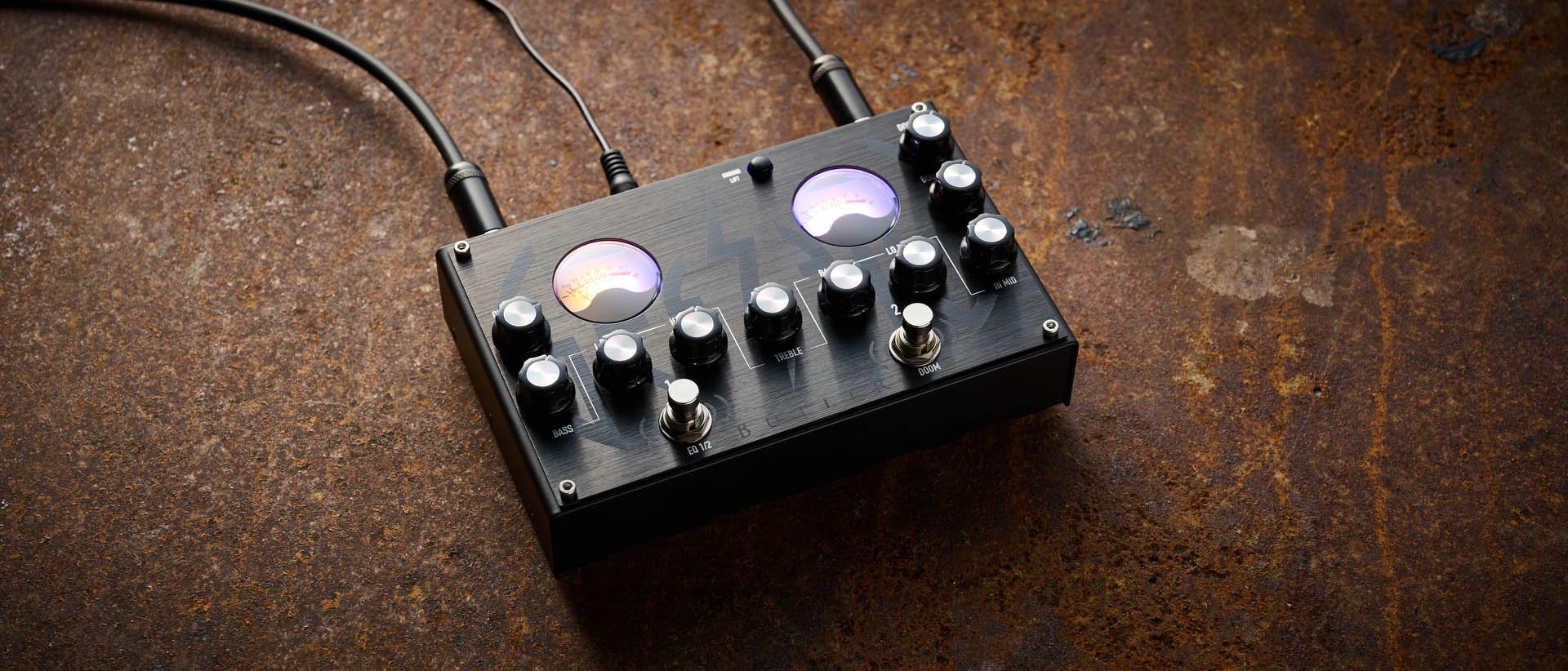
By all accounts, Guthrie Govan has enjoyed the kind of career most guitarists only dream about. Just 47 years old, the British-born virtuoso has either recorded or performed with a diverse group of artists that includes progressive rock icons (Steven Wilson, Asia), electronic dance hotshots (the Young Punx), hip-hop/grime pioneers (Dizzee Rascal) and Oscar-winning film composers (Hans Zimmer).
At the same time, he’s released a solo album (2006’s Erotic Cakes) and has established himself as one of the most sought-after gurus of guitar masterclasses, holding forth for budding shredders across the globe.
One might assume Govan has followed some sort of grand plan that he mapped out years ago, but the guitarist admits he’s benefited mostly from lucky strokes of serendipity.
“I’m not particularly business-minded,” he says, “so I’ve always tried to remain open to any random opportunities that might present themselves. I tend to make my decisions about any new venture based largely on how much the music excites me and the extent to which I feel I might have something valid to ‘bring to the table’.”
He cites his ongoing participation in the instrumental supergroup the Aristocrats (which includes two other highly sought-after session aces, bass maven Bryan Beller and drumming whiz Marco Minnemann) as one such example.
Originally, the trio were brought together to perform a brief one-off set at the 2010 NAMM Show, but no sooner had the three started jamming, Govan realized they were destined for bigger things.
“Our decision to take things further and become a long-term, proper band was based entirely on our mutual recognition of the chemistry between the three of us, which became apparent during that first set,” he recalls. “We basically walked off stage and immediately resolved to record an album, which we did about three months later.”
All the latest guitar news, interviews, lessons, reviews, deals and more, direct to your inbox!

The Aristocrats’ self-titled debut album was full of the kind of face-melting chops one might expect from guys of their caliber; on songs that mixed metal, jazz swing and blues, the trio tapped, shredded and grooved at maximum overdrive.
But beyond their dizzying technical skills, the band also displayed a keen sense of comedic self-awareness, bestowing their hyperkinetic send-up of blues clichés with the title Blues Fuckers.
Laying to waste the notion that the band is any kind of stodgy, ultra-serious prog outfit, Guthrie says, “I concede that we can all operate our instruments with a certain degree of proficiency, but what we’re really hoping to achieve with the Aristocrats is to communicate how much fun we have when we make music together. We want to make other people feel better, not worse.”
While continuing their careers as in-demand sidemen, the Aristocrats have issued two more highly adventurous (and ridiculously entertaining) albums, 2013’s Culture Clash and 2015’s Tres Caballeros, and now comes a fourth, You Know What...?
In terms of quirkiness, it’s mad as a hatter. If the psycho-funk romp D Grade Fuck Movie Jam doesn’t throw you for a loop, then the jazz-tinged, odd-time wonder Spanish Eddie will leave you utterly breathless.
Metal doesn’t get much heavier than the behemoth ode to dinosaurs, Terrible Lizard, and when it comes to sheer epic scale, the eight-and-a-half-minute multi-mood gem Last Orders could be called the Lawrence of Arabia of instrumental rock.
"Licks-wise, there’s not a fleet-fingered run or an unhinged noise that Govan doesn’t manage to cover on You Know What...? Indeed, he could pack a week’s worth of his clinics detailing his outlandish musicianship contained on the new album.
"But as he points out, his goal wasn’t to simply write vehicles for guitar tricks, as he calls them. “I’m particularly interested in two aspects of writing for this band, and they’re kind of polar opposites,” he says.
“On the one hand, I always try to incorporate a loose open section where we can channel the more ‘live’ side of what we do as a trio. On the other hand, the more composed sections of my Aristocrats tunes tend to be very composed.
"Elaborating further," he explains, “I always find myself spending an unusual amount of time honing basslines in an attempt to convey as much harmonic interest as I can within the limitations of the trio format. Somehow this helps me to remind myself that I should try to write ‘music’ for this band rather than ‘guitar music.’”
When you guys reconvene to make a record, are you surprised at anything new they’re playing - and are they blown away by something you’ve come up with?
After several months playing in Hans Zimmer's live band with almost 70 musicians on the stage, I came back to the Aristocrats with a different perspective on the pros and cons of a raw power-trio format
"We probably surprise each other the most in the way we write for the band. We’ve played hundreds of shows together, so we have a good understanding of one another’s musical voices. But I think each of us still managed to come up with new material for this album that the others weren’t expecting."
The three of you are very active outside of the band. How important is that to keeping the Aristocrats fresh?
"I think it’s a very healthy thing that we all have other musical outlets. Playing a wide variety of music with different people can be a great source of inspiration, and that almost certainly has direct benefits on our trio’s quest to keep things fresh.
"I vividly remember reconvening with Marco and Bryan after my first tour with Hans Zimmer’s live band. After several months of playing predominantly orchestral music with almost 70 musicians on the stage, I came back to the Aristocrats with a different perspective on the pros and cons of a raw power-trio format."
Each of you wrote and produced three songs for the album. Do you start with more and whittle them down?
"When we were preparing our first album, I quickly discovered how prolific Marco is as a writer; I lost count of all the potential ideas he sent over! Bryan and I tend to operate at a different pace compositionally, so he and I have always tried to focus on just three songs per album, doing our best to make sure they’ll want final-cut status if we try hard enough."
![Looking very aristocratic! [from left] Marco Minnemann, Bryan Beller and Guthrie Govan](https://cdn.mos.cms.futurecdn.net/vvLoU9Y7qgymYzMTFVk8dL.jpg)
Do you guys have a vote in one another’s material?
"Veto power absolutely exists. The collective philosophy is that we shouldn’t need to play any piece of music if one or more of us simply isn’t feeling it. Having said that, veto power has yet to be used, so it’s still a purely theoretical construct at this stage in the band’s story."
Were there particular areas of composition or genres you wanted to explore?
It goes without saying that Steve Vai has played a very significant role in expanding the dictionary of usable guitar noises
"I guess so, but more subconsciously than deliberately. I have no idea why I wanted to write something like Spanish Eddie, other than harboring a vague desire to hear something that infused a progressive approach with Spanish flavorings - and not being aware of any existing piece of music that combined those elements in quite that way."
Did you set out to write Terrible Lizard about dinosaurs, or did the title come about once you listened to it?
"Oh, the dinosaur concept was fully formed right from the start, and the main riff was very deliberately constructed in the hope of evoking the thunderous footsteps of some giant lizard.
"I’ve been fascinated by dinosaurs since infancy. What kid doesn’t like dinosaurs? Actually, I’m puzzled it took me so long to get around to paying tribute to them in musical form."
The song has some of the best distortion sounds I’ve ever heard. What are you using to get such awesome crunch?
"Why, thank you! That tone was basically my ash-bodied Charvel and a Victory V30 head with just a hint of extra filth courtesy of an Xotic EP Booster."
Is the 'squawking' section a tip of the hat to Steve Vai?
"Not deliberately, but part of the fun of electric guitar for me lies in exploring all the different sounds that can be coaxed out of it. It goes without saying that Steve Vai has played a very significant role in expanding the dictionary of usable guitar noises, and his playing was a huge influence in my formative years. Some of those elements have naturally been absorbed into my musical DNA."
Spanish Eddie is sustained beauty. The mid-section is so delicate and light. Did you have to be in a certain mood to cut it?
"It’s interesting that you singled out that spot, as finding the right vibe for the middle section did indeed take a little while. Our natural inclination at first was for the jam to build slowly but surely toward some kind of frenzied fusion climax.
"While we had a lot of fun recording various more manic versions of that section, I somehow felt that the overall arc of the song required something gentle at that point to enhance the surprise factor in the section that comes next."
In that midsection, you’re doing some gorgeous jazz soloing. Any influences you can reference there?
"That soloing came from a slightly strange place. I suppose I did want to channel a little bit of George Benson, not that I profess to be any kind of authority in that style.
"But I was also very conscious of playing a bolt-on guitar with .010 gauge strings, so occasionally you hear some slightly inappropriate 'blues guy' bends and vibrato creeping in."
It blasts into a tricky metal section. How are you playing that furious riff?
"For me, the fun part of that song is the way the underlying pulse shifts from 6/8 to 3/4; the metal section culminates in a reprise of the opening guitar motif, but it somehow sounds different because of the rhythmic implications of Marco reinforcing the 3/4 feel.
"I’ve found it interesting to note that quite a few people assumed that guitar pattern involves some kind of tapping, but it’s all played conventionally in drop-D tuning, alternating open strings with hammer-ons."

Mood-wise, Last Orders is pretty vast. Did you have pieces for separate songs, or did you always see it as one piece?
"I struggled for a while with that one. The main melody came to me fully formed and it wouldn’t go away, so I felt a sense of obligation to turn it into a full song.
"It took me a while to figure out where else it should go after the main theme; I guess my final decision was a slightly odd one, but somehow I found it to have the right blend of satisfying and unexpected."
The wildcat solo in the middle is a scorcher. What amp/guitar settings were you using?
"The solo tone was created using the same basic ingredients as Terrible Lizard but also using the mini-switch on the Charvel to coax an approximation of a single tone from the bridge humbucker.
"Then I tweaked the EQ on the amp to bring back some midrange thickness. There’s an atypical amount of delay and reverb on there, too - I just wanted that tone to be wetter than usual, possibly in the hope of making it sit more elegantly in the middle of all the clean tone stuff."
When We All Come Together is one of Marco’s tunes. It’s very American sounding, with fast country and chicken pickin’. Where does that come from in your bag of influences?
"My early years were largely shaped by the contents of my parents’ record collections, and for whatever reason the whole 'hot country' genre was somewhat under-represented.
For me, the desire to learn something new typically comes from hearing something I like but don’t entirely understand
"So I think much of my initial awareness of that style of playing came from background music on TV commercials and movies rather than from seeking out any particular artist for study purposes.
"Later on, I discovered James Burton and Albert Lee, and later still I stumbled upon Danny Gatton and Jerry Donahue. I was very excited by both of those players, as they each seemed to have a refreshingly unique approach to the science of Telecaster playing."
Your 'twang' sounds very authentic on that song. What kind of amp settings and effects were you using for it?
"Amp-wise, that was just the clean channel of the Victory V30 head. The real secret weapon in that song was a bizarre instrument that I found lying around in the studio - I believe it was called a BilT Corvaire.
"To me, this guitar looked like a thoroughly eccentric mashup of elements from various unrelated classic designs: a Jazzmaster vibrato unit, f-holes that ran through the entire thickness of the body, and so on. But it sounded just perfect for that track."
What were your main guitars you used for the album? I assume you used your signature Charvel…
"Mainly I used the ash-bodied Charvel. I flew over to sunny California for the sessions carrying just one guitar and one head, so that instrument was my workhorse for most of the recording.
"Having said that, the studio had a fine collection of other instruments, and we were invited to check everything out and use anything that intrigued us. I used a '60s Jazzmaster for Spiritus Cactus, a '70s Les Paul for The Ballad of Bonnie and Clyde and I used virtually every instrument in the studio for When We All Come Together."
What about effects and amps?
"The go-to amp was my Victory V30 head, but I did try something new for the clean parts of tracks like Spanish Eddie and Last Orders in the form of a Vox AC30 that seemed to pair up very nicely with the single-coil settings on my Charvel."

"Oh, and I also used a small Carr combo for All Said and Done, though, alas, I honestly can’t remember the model name. In terms of effects, I brought my Xotic wah and EP booster, a Providence Anadime Chorus, an Eventide H9 - mostly for the synth algorithms, as heard on Burial at Sea - and a volume pedal.
"I also borrowed the in-house Univibe for D-Grade. But apart from that, the sessions weren’t particularly effects-heavy."
Have you ever gone up a blind alley trying to learn something on the guitar, or do you think anything you can learn has merit?
"I believe the latter. I don’t see how it’s possible to have too much technique or knowledge. I’m a big believer in knowing why you want to learn something, and I suspect that allotting practice time on that basis can help to solve many players’ blind alley problems.
"For me, the desire to learn something new on or about the instrument typically comes from hearing something I like but don’t entirely understand, and then saying to myself, 'I can imagine how I would actually use that if only I could learn how to do it...'
"That’s somewhat different from saying, 'I need to learn how to do that because the fact that other people know how to do it somehow makes me feel inadequate.'"
Joe is a freelance journalist who has, over the past few decades, interviewed hundreds of guitarists for Guitar World, Guitar Player, MusicRadar and Classic Rock. He is also a former editor of Guitar World, contributing writer for Guitar Aficionado and VP of A&R for Island Records. He’s an enthusiastic guitarist, but he’s nowhere near the likes of the people he interviews. Surprisingly, his skills are more suited to the drums. If you need a drummer for your Beatles tribute band, look him up.




